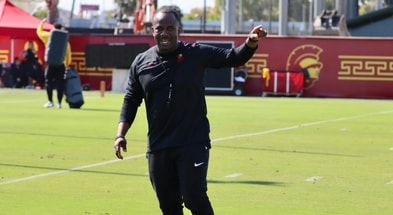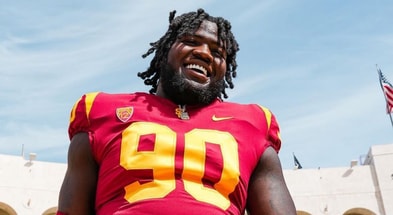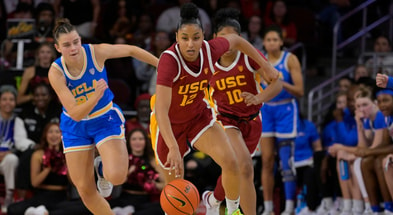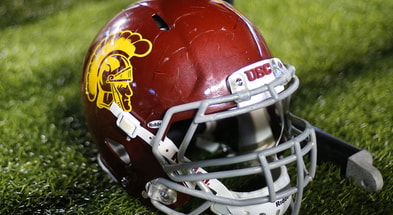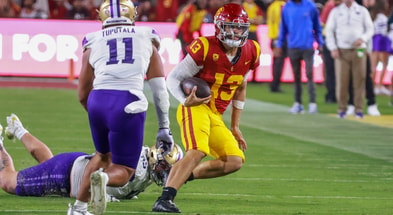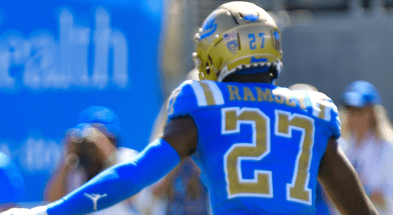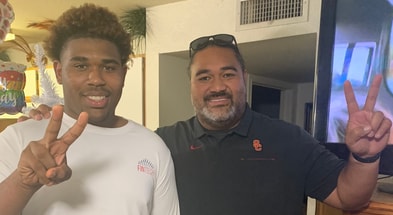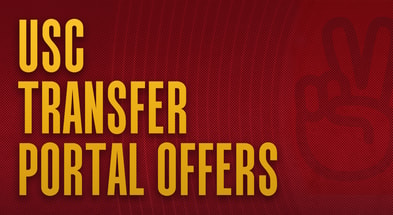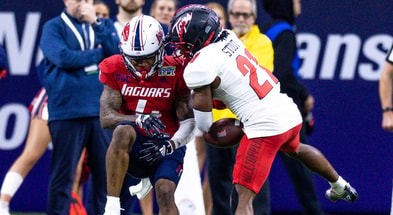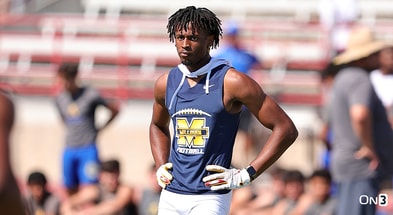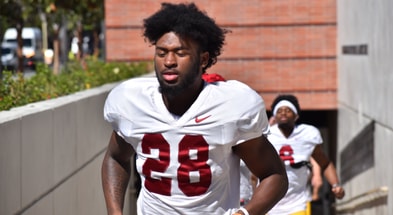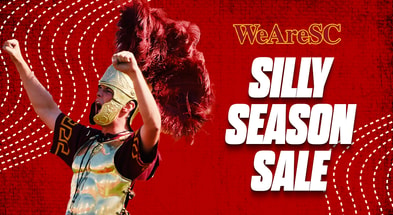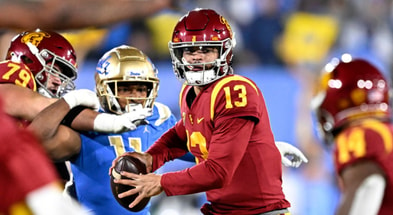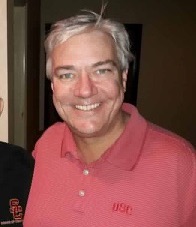Musings from Arledge: UBSAA Demands, Explosiveness, and Two Quarterbacks
It is risky to speak your mind these days. Americans are angry and frustrated–and for good reason–which means this is a time when we really should be speaking up. But, right now, we only listen to people who already agree with us; we assume the worst of those who don’t. And the online mob is always eager to pounce, waiting to destroy reputations and careers for any who deviate from the latest orthodoxy.
That makes speaking up dangerous. So I’m going to do something foolish, as usual, and comment on an issue that is directly related to USC football but is also an issue on which emotions will run high.
Anna Cockrell, a USC track star, published on Twitter a letter to Mike Bohn from the United Black Student-Athletes Association (UBSAA). The letter makes certain requests, or demands, of the USC athletic department. I have no opinions as to most of those requests. I lack first-hand knowledge of the problems facing Black student athletes, so I will tread carefully when thinking about the best methods for alleviating those problems.
But two of the requests merit real attention. The first is critical and right. The UBSAA demands that USC promise that no student-athlete will be retaliated against for protesting or making public statements related to racial injustice or the Black Lives Matter movement. USC should grant this request. In fact, USC should go further and declare that no student will be punished for speaking his or her mind on any political or social issue. A university should be–but these days tends not to be–a place where people can speak freely on the important issues of the day. This free exchange of ideas used to be at the heart of a university’s mission–and this country’s mission, for that matter–and should be so again. It would be wrong for the university to punish a student athlete for political speech. Mike Bohn and Carol Folt should make clear that USC will not do so.
But this brings me to a potential problem with the UBSAA’s statement: the USBAA also demands that the USC athletic department “take immediate action to support current protests and Black Lives Matter by directing fans and supporters to donate to Black organizations and bail funds for protestors.”
Let’s put aside the absurdity of the USC athletic department “demand[ing]” that any USC fan or supporters do anything with their own money. USC isn’t in a position to make such demands.
But I’m going to assume that “direct” was simply a bad word choice and that the USBAA is really demanding that USC publicly tell its fans and supporters that they have a moral obligation to donate to Black organizations and bail funds for protestors and that USC strongly encourages them to do so.
If this is what the USBAA is arguing, the USBAA is wrong and should withdraw the demand. It is important to understand why. The USBAA letter champions free speech for USC student-athletes; yet this demand–unwittingly, I suspect–is a threat to the very freedoms they rightly claim for themselves.
My view has nothing to do with the value of Black organizations – there are many that are valuable and deserving of donations – or the validity of the protests. I am a big believer in peaceful demonstrations and protests. Not only does the First Amendment protect such activities, but peaceful demonstrations and protests can change the world, as this country’s civil rights movement, the mass demonstrations at the end of the Cold War, Tiananmen Square, and Hong Kong have shown. I believe the recent protests over George Floyd’s killing have been valuable, have led to necessary changes, and will likely lead to more changes.
But must I believe those things to be a member in good standing of the USC community?
Look, there are legitimate, reasonable, and non-racist reasons why some people may not support the protests. I have been to three of the protests in Dallas and Fort Worth, where I live. They have been peaceful. The participants have expressed legitimate, righteous anger. I believe the protests here have, on the whole, been a force for good.
But reasonable people can disagree with some of what I have seen and heard there. Some people may not support chanting “F*** those racist a** police!” – a common chant at all three rallies I’ve witnessed in-person – or may not support the invective directed at people who had little or nothing to do with the Minneapolis Police Department, George Floyd’s death, or other acts of police brutality.
Others may think the protests are associated too closely with political or social causes too different from their own; they may not want to defund police departments, for example, or they may be uncomfortable that socialist and anarchist groups also have a presence at some of these rallies. Some people may be uncomfortable that a small minority of protestors have destroyed property or acted violently. Others may simply think that the protests are not an effective solution since they do not advocate specific changes – or do not advocate the right specific changes – and therefore have not led to any accountability for the people actually responsible for George Floyd’s death (I note that the mayor of Minneapolis still has his job; the Minneapolis police chief still has his; and the collective bargaining agreement that shielded Derek Chauvin from dismissal after his many prior incidents of misconduct is still in place). Some people may think that the police killings we have seen are not caused by systemic racism but by something else – a few bad apples, or defective law-enforcement training or culture.
I am not advocating for any of those contrary viewpoints. The people who believe those things may be entirely wrong. The point is that I strongly support the protestors’ right to speak their minds. I believe they are speaking up about issues that need to be addressed and problems that need to be solved. But the right to speak freely, without fear of retribution or retaliation, the right that the USBAA rightly demands for themselves, a right that USC should promise will be protected, is a right that belongs to USC football fans and supporters as well.
That is, USC fans and supporters have the same right as the USBAA to protest or not to protest; to advocate for political positions or to choose not to; to donate to charities that the USBAA supports or not. George Floyd should not have died. But how exactly we go about fixing what ails our country is complicated and will require a lot of people from different backgrounds and different perspectives to work together. Forced uniformity of opinion is the stuff of totalitarian police states, not free people.
And therefore USC has no business instructing its hundreds of thousands of supporters that they must have a single, unified position on any complex cultural or political issue. USC has no business directing its fans and supporters in what political movements they should support. USC has no business directing USC fans and supporters to give our money to certain organizations or political or social causes.
May USC student athletes long feel free to speak their minds and advocate for the change they believe is necessary and just. And may the rest of us also long exercise those same rights.
Shravan Janakiraman published a very good article on WeAreSC.com the other day showing how USC compared to the Pac-12 champions in various team statistics. I think the article showed what most of us have long assumed from the eyeball test: USC has fared poorly in those areas of the game that are most tied to physicality (rushing offense and defense) and discipline (penalties and turnovers).
For a lot of the traditional team statistics, it’s hard to find a strong correlation between high rankings and wins. Passing offense, for example, means very little. Lots of bad teams throw for tons of yards. Indeed, when you are way behind you have little choice but to throw the ball all over the yard. Mike Leach’s teams will be among the total passing leaders every year. That doesn’t mean that Mike Leach’s teams are close to winning championships. (But they are probably closer than they’d be with a lesser head coach.)
Most of the research on advanced metrics concerns the NFL, and that information is still valuable for college football fans, especially as the NFL game moves closer to the college game in terms of style. But there has been some very good college football analysis. This article persuasively argues that there are five metrics that determine college football success.
One of these factors is what the author calls explosiveness, which is really the difference between a team’s yards per plan on offense and yards per play given up on defense. And there does seem to be a pretty good correlation between this statistical measure and wins. Here are the numbers from the Pac 12 for the last two years:
(OYPP = Offensive yards per play, DYPP = Defensive yards per play)
2019
| Team | OYPP | DYPP | Diff. |
| Ore | 6.2 | 4.6 | +1.6 |
| Utah | 6.2 | 4.6 | +1.6 |
| USC | 6.3 | 5.5 | +.8 |
| Wash | 5.6 | 5.1 | +.5 |
| WSU | 6.8 | 6.6 | +.2 |
| ASU | 5.5 | 5.5 | 0 |
| OSU | 5.5 | 6.0 | -.5 |
| Cal | 4.7 | 5.3 | -.6 |
| Stan | 5.4 | 6.1 | -.7 |
| Ariz | 5.5 | 6.3 | -.8 |
| Colo | 5.4 | 6.3 | -.9 |
| UCLA | 5.1 | 6.5 | -1.4 |
2018
| Team | OYPP | DYPP | Diff. |
| Wash | 5.7 | 4.6 | +1.1 |
| WSU | 6.0 | 5.3 | +.7 |
| Utah | 5.4 | 4.7 | +.7 |
| Stan | 6.0 | 5.6 | +.4 |
| Ore | 5.6 | 5.2 | +.4 |
| USC | 5.6 | 5.2 | +.4 |
| ASU | 5.9 | 5.6 | +.3 |
| Cal | 4.6 | 4.4 | +.2 |
| Ariz | 5.8 | 5.7 | +.1 |
| Colo | 5.1 | 5.2 | -.1 |
| UCLA | 5.3 | 5.9 | -.6 |
| OSU | 4.7 | 7.5 | -2.8 |
We should be able to draw a few conclusions from these tables.
First, if we were expecting the best teams to have the best differentials, then you won’t be disappointed, because that is largely how things play out.
Second, the 2018 USC team was historically bad (by USC standards), but its point differential was not shocking. Only three teams had a better differential, and six teams were worse. Of course, this statistic doesn’t take into account penalties and turnover differential, both of which have been devastating to USC under Clay Helton.
Third, what in the world is Chip Kelly doing at UCLA? I mean it’s funny and all … but, really, Chip?
Fourth, these are mediocre numbers throughout the conference. Elite teams tend to have very substantial differentials, and the Pac 12 simply has no elite teams. Washington won the conference with an unimpressive 1.1 differential in 2018, and Oregon and Utah were not elite by national standards last year.
By way of comparison, Alabama was +2.9 last year and +3.0 the year before. Clemson was +2.7 and +3.1, and Ohio State was +2.9 last year. USC is so far from elite numbers that it really can’t see those teams without the aid of a high-powered telescope. But we knew that already. To get there, USC will have to double its improvement from 2018 to 2019 and then double it again.
Oh, and just in case you’re curious (and I know you are), here are three of Pete Carroll’s better-known teams:
2003 – Offense 6.4, Defense 4.2, Diff +2.2
2004 – Offense 6.2, Defense 4.1, Diff +2.1
2008 – Offense 6.5, Defense 3.5, Diff +3.0
And Clay Helton’s best team:
2016 – Offense 6.3, Defense 5.2, Diff +1.1
USC now has two elite QB commitments in what is shaping up to be a very good class. This always makes some fans nervous, because they do not believe that both quarterbacks can be happy.
They’re right. Having commitments from two elite QB’s in the same class means that either Jake Garcia or Miller Moss will probably eventually transfer.
And that is a very good thing. Because whoever stays is highly likely to be the better guy. And you don’t always know in advance who that will be.
I’m glad USC took Carson Palmer in the same class as Jason Thomas. I’m glad they took San Darnold in the same class as Ricky Town. And I’m likely to be happy that they took Miller Moss and Jake Garcia in the same class, too.
Now the Trojans just need to win enough to keep this excellent class intact.
Carthago delenda est.
